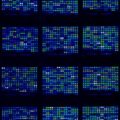
Thomas Wood, a professor in Texas A&M University’s chemical engineering department, has “tweaked” a strain of E. coli so that it produces 140 times more hydrogen than is created in a naturally occurring process. Wood, writing about his work in Microbial Biotechnology, envisions his success as a significant stepping stone on the path to the hydrogen-based economy that many believe will replace our present-day oil-driven society.
Currently, most of the hydrogen produced globally is created by a process known as “cracking water” through which hydrogen is separated from the oxygen. The process is expensive and requires vast amounts of energy but Wood’s work with E. coli could dramatically lower hydrogen production costs.
“These bacteria have 5,000 genes that enable them to survive environmental changes,” Wood explained. “When we knock things out, the bacteria become less competitive. We haven’t given them an ability to do something. They don’t gain anything here; they lose. The bacteria that we’re making are less competitive and less harmful because of what’s been removed.”
Wood says that the new strain of E. coli will take advantage of existing and ever-expanding industrial techniques aimed at producing sugar from certain crops, such as corn. And the simplicity of the process makes it possible for hydrogen to be generated on-site, rather than transported by pipeline. “The main thing we think is you can transport things like sugar, and if you spill the sugar there is not a huge catastrophe,” Wood said. “The idea is to make the hydrogen where you need it.”
“The size of the reactor that we’d need today if we implemented this technology would be less than the size of a 250-gallon fuel tank found in the typical east-coast home,” said Wood, who plans to continue work on refining the process. “At this point, you or a machine would have to shovel in about the weight of a man every day so that the reactor could provide enough hydrogen to take care of the average American home for a 24-hour period. We’re trying to make bacteria so it’s doesn’t require 80 kilograms; it will be closer to 8 kilograms.”
Related:
Candy-Munching Bacteria Prodigious Hydrogen Producers
Microbial Fuel Cell Produces Hydrogen & Cleans Wastewater
Bacterium Fires-Up Plain Air Fuel Cell
GM Bacteria Making Plastics








Comments are closed.